
Orthographic-changing verbs change the spelling of certain consonants when it is necessary to maintain a uniform pronunciation of their stems.
Verbs ending in -car change c to qu before the letter e.
Buscar to look for
Present Indicative: busco, etc. I look for, etc. (p. 1)
Imperfect: buscaba, etc. I was looking for, etc. (p. 8)
Preterit: busqué, buscaste, buscó, etc. I looked for, etc. (p. 13)
Future: buscaré, etc. I will look for, etc. (p. 20)
Conditional: buscaría, etc. I would look for, etc. (p. 26)
Present Participle: buscando looking for
Past Participle: buscado looked for
Present Subjunctive: busque, busques, busque, busquemos, busquéis, busquen that I look for/will look for, etc.
Imperfect Subjunctive: buscara (buscase), etc. that I looked/would look for, etc.; if I looked for, etc. (p. 46)
Present Perfect Subjunctive: haya buscado, etc. that I (have) looked for, etc. (p. 49)
Pluperfect Subjunctive: hubiera (hubiese) buscado, etc. that I had looked for/would have looked for, etc.; if I had looked for, etc. (p. 49)
Verb forms not in italics are not affected.

Verbs ending in -gar change g to gu before the letter e. The u is not pronounced.
Pagar to pay
Present Indicative: pago, pagas, etc. I pay, etc.
Imperfect: pagaba, etc. I was paying, etc.
Preterit: pagué, pagaste, pagó, etc. I paid, etc.
Future: pagaré, etc. I will pay, etc.
Conditional: pagaría, etc. I would pay, etc.
Present Participle: pagando paying
Past Participle: pagado paid
Present Subjunctive: pague, pagues, pague, paguemos, paguéis, paguen that I pay (for)/will pay (for), etc.
Imperfect Subjunctive: pagara (pagase) that I paid (for)/would pay (for), etc.; if I paid (for), etc.
Present Perfect Subjunctive: haya pagado, etc. that I (have) paid (for), etc.
Pluperfect Subjunctive: hubiera (hubiese) pagado, etc. that I had paid (for)/would have paid (for), etc.; if I had paid for, etc.
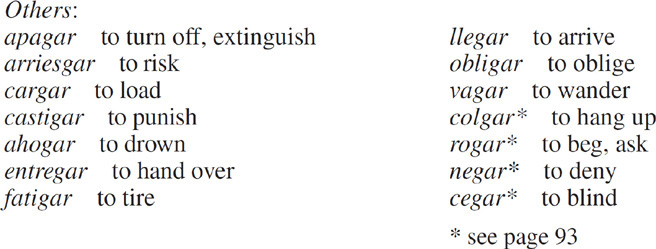
Verbs ending in -zar change z to c before the letter e.
Rezar to pray
Present Indicative: rezo, rezas, etc. I pray, etc.
Imperfect: rezaba, etc. I was praying, etc.
Preterit: recé, rezaste, rezó, etc. I prayed, etc.
Future: rezaré, etc. I will pray, etc.
Conditional: rezaría, etc. I would pray, etc.
Present Participle: rezando praying
Past Participle: rezado prayed
Present Subjunctive: rece, reces, rece, recemos, recéis, recen, that I pray/will pray, etc.
lmperfect Subjunctive: rezara (rezase), etc. that I prayed/would pray, etc.; if I prayed, etc.
Present Perfect Subjunctive: haya rezado, etc. that I (have) prayed, etc.
Pluperfect Subjunctive: hubiera (hubiese) rezado, etc. that I had prayed/would have prayed, etc.; if I had prayed, etc.
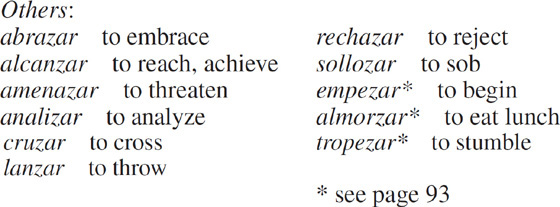
Verbs ending in -guar change gu to gü before e. The u requires a diaeresis (..) before e to preserve the u sound.
Averiguar to find out, verify
Present Indicative: averiguo, etc. I find out, etc.
lmperfect: averiguaba, etc. I was finding out, etc.
Preterit: averigüé, averiguaste, averiguó, etc. I found out, etc.
Future: averiguaré, etc. I will find out, etc.
Conditional: averiguaría, etc. I would find out, etc.
Present Participle: averiguando finding out
Past Participle: averiguado found out
Present Subjunctive: averigüe, averigües, averigüe, averigüemos, averigüéis, averigüen that I find out/will find out, etc.
lmperfect Subjunctive: averiguara (averiguase), etc. that I found out/would find out, etc.; if I found out, etc.
Present Perfect Subjunctive: haya averiguado, etc. that I (have) found out, etc.
Pluperfect Subjunctive: hubiera (hubiese) averiguado, etc. that I had found out/would have found out, etc.; if I had found out, etc.
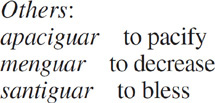
Write in the present subjunctive in the person indicated:
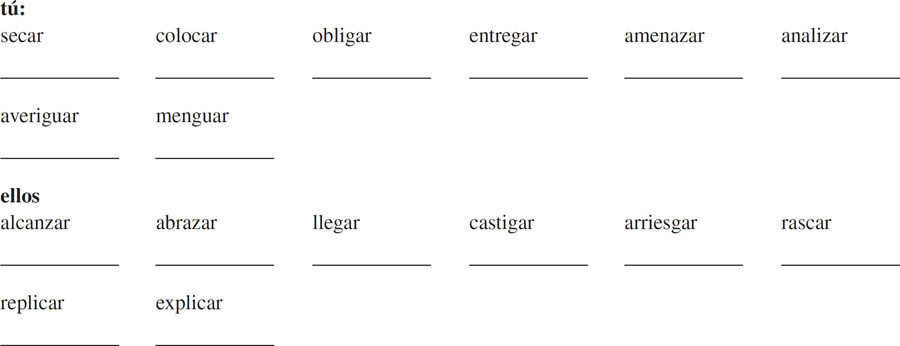
Write in the first-person singular preterit indicative:

A. Translate into English:
1. que él explique _________________________
2. si Ud. marcara _________________________
3. que yo apague _________________________
4. abracé _________________________
5. entregué _________________________
6. que tropecemos _________________________
7. que ellos sequen _________________________
8. que castigues _________________________
9. que Ud. rechace _________________________
10. que averigües _________________________
11. que tú repliques _________________________
12. que carguemos _________________________
13. que amenaces _________________________
14. que ella entregue _________________________
15. saqué _________________________
16. que santigüemos _________________________
17. que él llegue _________________________
18. que Uds. analicen _________________________
19. que apacigüen _________________________
20. que él alcance _________________________
B. Translate into Spanish:
1. I hope we pacify _________________________
2. 1 paid _________________________
3. it’s possible that they will take out _________________________
4. I did not find out _________________________
5. it’s possible that he will punish _________________________
6. it’s possible that he won’t place _________________________
7. I risked _________________________
8. I hope we don’t tire (get tired) _________________________
9. it’s possible that she won’t reply _________________________
10. it’s possible that you (s., fam.) will cross _________________________
11. I hope you (pl., fam.) don’t beg _________________________
12. I indicated _________________________
13. he prays _________________________
14. I hope you (s., fam.) throw _________________________
15. I hope they arrive _________________________
16. I did not explain _________________________
17. it’s impossible that we analyze (for us to analyze) _________________________
18. I hope that you (pl., for.) reply _________________________
19. I threw _________________________
20. I sobbed _________________________
Some verbs ending in -cer and -cir preceded by a consonant change c to z before o or a.
Vencer to conquer
Present Indicative: venzo, vences, etc. I conquer, etc.
Imperfect: vencía, etc. I was conquering, etc.
Preterit: vencí, etc. I conquered, etc.
Future: venceré, etc. I will conquer, etc.
Conditional: vencería, etc. I would conquer, etc.
Present Participle: venciendo conquering
Past Participle: vencido conquered
Present Subjunctive: venza, venzas, venza, venzamos, venzáis, venzan that I conquer/will conquer, etc.
Imperfect Subjunctive: venciera, (venciese), etc. that I conquered/would conquer, etc.; if I conquered, etc.
Present Perfect Subjunctive: haya vencido, etc. that I (have) conquered, etc.
Pluperfect Subjunctive: hubiera (hubiese) vencido, etc. that I had conquered/would have conquered, etc.; if I had conquered, etc.
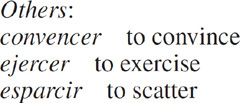
Verbs ending in -ger or -gir change g to j before an o or a.
Escoger to choose
Present Indicative: escojo, escoges, etc. I choose, etc.
Imperfect: escogía, etc. I was choosing, etc.
Preterit: escogí, etc. I chose, etc.
Future: escogeré, etc. I will choose, etc.
Conditional: escogería, etc. I would choose, etc.
Present Participle: escogiendo choosing
Past Participle: escogido chosen
Present Subjunctive: escoja, escojas, escoja, escojamos, escojáis, escojan that I choose/will choose, etc.
Imperfect Subjunctive: escogiera (escogiese), etc. that I chose/would choose, etc.; if I chose, etc.
Present Perfect Subjunctive: haya escogido, etc. that I chose/have chosen, etc.
Pluperfect Subjunctive: hubiera (hubiese) escogido, etc. that I had chosen/would have chosen, etc.; if I had chosen, etc.

Verbs ending in -guir drop the u before o or a.
Distinguir to distinguish
Present Indicative: distingo, distingues, etc. I distinguish, etc.
Imperfect: distinguía, etc. I was distinguishing, etc.
Preterit: distinguí, etc. I distinguished, etc.
Future: distinguiré, etc. I will distinguish, etc.
Conditional: distinguiría, etc. I would distinguish, etc.
Present Participle: distinguiendo distinguishing
Past Participle: distinguido distinguished
Present Subjunctive: distinga, distingas, distinga, distingamos, distingáis, distingan that I distinguish/will distinguish, etc.
Imperfect Subjunctive: distinguiera (distinguiese) etc. that I distinguished/would distinguish, etc.; if I distinguished, etc.
Present Perfect Subjunctive: haya distinguido, etc. that I (have) distinguished, etc.
Pluperfect Subjunctive: hubiera (hubiese) distinguido, etc. that I had distinguished/would have distinguished, etc.; if I had distinguished, etc.
Verbs ending in -quir change qu to c before o or a.
Delinquir to break the law
Present Indicative: delinco, delinques, etc. I break the law, etc.
Imperfect: delinquía, etc. I was breaking the law, etc.
Preterit: delinquí, etc. I broke the law, etc.
Future: delinquiré, etc. I will break the law, etc.
Conditional: delinquiría, etc. I would break the law, etc.
Present Participle: delinquiendo breaking the law
Past Participle: delinquido broken the law
Present Subjunctive: delinca, delincas, delinca, delincamos, delincáis, delincan that I break the law/will break the law, etc.
Imperfect Subjunctive: delinquiera (delinquiese), etc. that I broke the law/would break the law, etc.; if I broke the law, etc.
Present Perfect Subjunctive: haya delinquido, etc. that I broke/have broken the law, etc.
Pluperfect Subjunctive: hubiera (hubiese) delinquido, etc. that I had broken/would have broken the law, etc.; if I had broken the law, etc.
Write the verbs in the tense and person indicated:
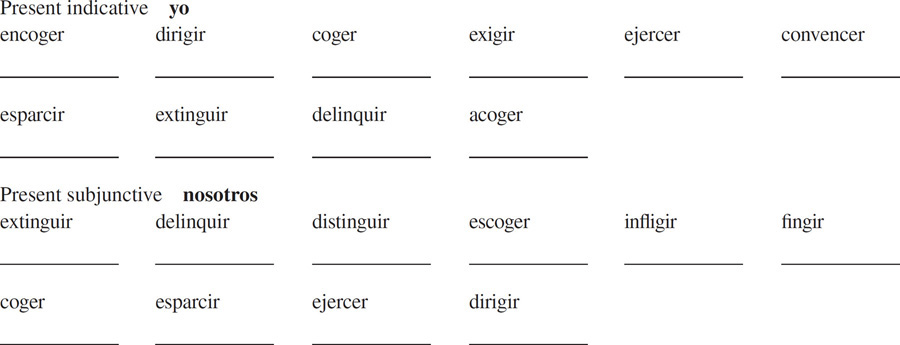
Translate into English:
1. ejerzo _________________________
2. Ud. convenció _________________________
3. esparciré _________________________
4. acogías _________________________
5. que ellos distingan _________________________
6. que finjamos _________________________
7. Uds. han convencido _________________________
8. dirigiré _________________________
9. él seguiría _________________________
10. que extingas _________________________
11. ejercías _________________________
12. exijo _________________________
13. seguí _________________________
14. extinguiste _________________________
15. que ellos convenzan _________________________
16. fingí _________________________
17. él delinquió _________________________
18. que ellos recojan _________________________
19. extingo _________________________
20. delincáis _________________________
Translate into Spanish:
1. if you (s., fam.) conquered _________________________
2. it’s possible that I will inflict _________________________
3. I distinguish _________________________
4. we exercised _________________________
5. I do not demand _________________________
6. I hope that you (s., fam.) don’t distinguish _________________________
7. he will not convince _________________________
8. will you (pl., for.) choose? _________________________
9. let us not extinguish _________________________
10. I scattered _________________________
11. we directed _________________________
12. he distinguished _________________________
13. I break the law _________________________
14. you (s., fam.) exercise _________________________
15. I hope that he will welcome _________________________
16. it’s possible that they will extinguish _________________________
17. it’s possible that they won’t convince _________________________
18. I pretend _________________________
19. you (pl., fam.) will distinguish _________________________
20. I hope that you don’t break the law _________________________.
Verbs ending in -eer change the i to y in the third-person singular and plural of the preterit, all persons of the imperfect subjunctive and the present participle.
Creer to believe
Present lndicative: creo, etc. I believe, etc.
Imperfect: creía, etc. I was believing, etc.
Preterit: creí, creíste, creyó, creímos, creísteis, creyeron I believed, etc.
Future: creeré, etc. I will believe, etc.
Conditional: creería, etc. I would believe, etc.
Present Participle: creyendo believing
Past Participle: creído believed
Present Subjunctive: crea, etc. that I believe/will believe, etc.
Imperfect Subjunctive: creyera (creyese), etc. that I believed/would believe, etc.; if I believed, etc.
Present Perfect Subjunctive: haya creído, etc. that I (have) believed, etc.
Pluperfect Subjunctive: hubiera (hubiese) creído, etc. that I had believed/would have believed, etc.; if I had believed, etc.
Additional Note: -er and -ir verbs whose stems end in a vowel have a written accent on the i of the past participle. The past participle of such verbs is otherwise regular. Example: creer creído.
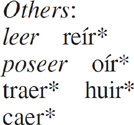
* See individual conjugations for these verbs (traer, pp. 124–125; caer, p. 105; reír, pp. 94–95; oír, p. 116; huir, p. 95).
Most verbs ending in -cer or -cir preceded by a vowel add z before c when followed by o or a.
Conocer to know, be acquainted with
Present Indicative: conozco, conoces, etc. I know, etc.
Imperfect: conocía, etc. I was knowing, etc.
Preterit: conocí, etc. I knew, etc.
Future: conoceré, etc. I will know, etc.
Conditional: conocería, etc. I would know, etc.
Present Participle: conociendo knowing
Past Participle: conocido known
Present Subjunctive: conozca, conozcas, conozca, conozcamos, conozcáis, conozcan that I know/will know, etc.
Imperfect Subjunctive: conociera (conociese), etc. that I knew/would know, etc.; if I knew, etc.
Present Perfect Subjunctive: haya conocido, etc. that I knew/have known, etc.
Pluperfect Subjunctive: hubiera (hubiese) conocido, etc. that I had known/would have known, etc.; if I had known, etc.

Some verbs ending in -iar accent the i of the stem in all forms of the present indicative and present subjunctive, except the nosotros and vosotros forms.
Enviar to send
Present Indicative: envío, envías, envía, enviamos, enviáis, envían I send, etc.
Imperfect: enviaba, etc. I was sending, etc.
Preterit: envié, etc. I send, etc.
Future: enviaré, etc. I will send, etc.
Conditional: enviaría, etc. I would send, etc.
Present Participle: enviando sending
Past Participle: enviado sent
Present Subjunctive: envíe, envíes, envíe, enviemos, enviéis, envíen that I send/will send, etc.
Imperfect Subjunctive: enviara (enviase), etc. that I sent/would send, etc.; if I sent, etc.
Present Perfect Subjunctive: haya enviado, etc. that I (have) sent, etc.
Pluperfect Subjunctive: hubiera (hubiese) enviado, etc. that I had sent/would have sent, etc.; if I had sent, etc.
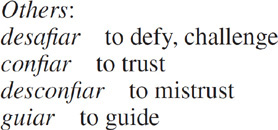
Verbs ending in -uar preceded by any consonant except c or g accent the u in all forms of the present indicative and present subjunctive except the nosotros and vosotros forms.
Continuar to continue
Present Indicative: continúo, continúas, continúa, continuamos, continuáis, continúan I continue, etc.
Imperfect: continuaba, etc. I was continuing, etc.
Preterit: continué, etc. I continued, etc.
Future: continuaré etc. I will continue, etc.
Conditional: continuaría, etc. I would continue, etc.
Present Participle: continuando continuing
Past Participle: continuado continued
Present Subjunctive: continúe, continúes, continúe, continuemos, continuéis, continúen that I continue/will continue, etc.
Imperfect Subjunctive: continuara (continuase), etc. that I continued/would continue, etc.; if I continued, etc.
Present Perfect Subjunctive: haya continuado, etc. that I (have) continued, etc.
Pluperfect Subjunctive: hubiera (hubiese) continuado, etc. that I had continued/would have continued, etc.; if I had continued, etc.
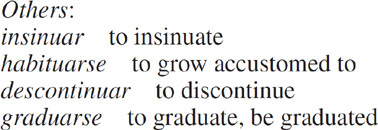
Write the infinitives in the tense and person indicated:
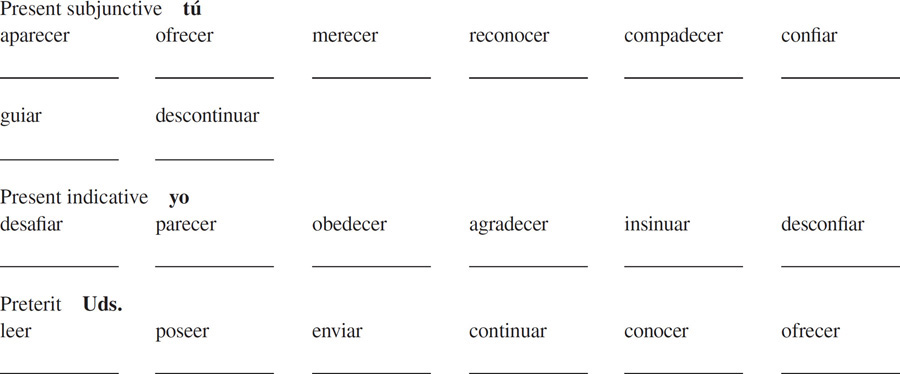
Change each verb to the corresponding tense in the plural:
1. estoy leyendo _________________________
2. envías _________________________
3. continúes _________________________
4. ofrezco _________________________
5. Ud. desafíe _________________________
6. aborrezcas _________________________
7. yo merezca _________________________
8. Ud. aparezca _________________________
9. guío _________________________
10. desconoció _________________________
11. poseyó _________________________
12. Ud. insinúe _________________________
13. se enriquezca _________________________
14. parecí _________________________
15. me habitué _________________________
16. yo creyese _________________________
17. Ud. complacía _________________________
18. ella desconfía _________________________
19. descontinúo _________________________
20. reconozco _________________________
Translate into Spanish:
1. did she read? _________________________
2. it’s possible that we will disappear _________________________
3. I hope she continues _________________________
4. it’s possible that they will send _________________________
5. I was possessing _________________________
6. it’s possible that you (s., for.) don’t know _________________________
7. it’s possible that we mistrust _________________________
8. I do not guide _________________________
9. it is possible that they have read _________________________
10. it is possible that he feels sorry for _________________________
11. I was sending _________________________
12. it’s possible that you (s., fam.) will discontinue _________________________
13. we were believing _________________________
14. you (pl., fam.) disappear _________________________
15. they sent _________________________
16. she did not believe _________________________
17. I hated _________________________
18. do you (s., fam.) trust? _________________________
19. it’s impossible that they know _________________________
20. she continued _________________________